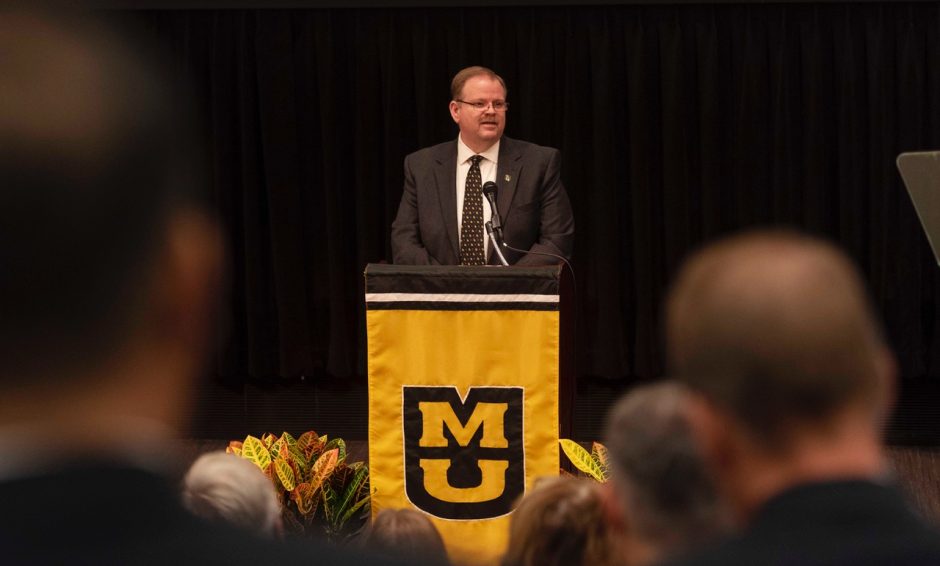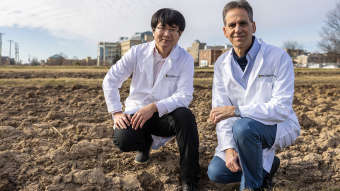Oct. 11, 2019
Contact: Eric Stann, 573-882-3346, StannE@missouri.edu

University of Missouri Chancellor Alexander N. Cartwright made the case during his State of the University address that Mizzou’s value goes far beyond its significant progress in enrollment, giving and research — and is much better demonstrated by students, staff, faculty and alumni who contribute to Missouri, the world and to society.
By strategically leveraging the university’s strengths and focusing on its most valuable assets — its people — Cartwright said that Mizzou is directing its energy on addressing grand challenges of the world, while also educating the next generation of leaders and translating innovations to society.
“We have to enhance our historic strengths so that we can truly become world leaders in certain areas,” Cartwright said. “But we also have to rethink what it means to be a public, land-grant institution as we build the flagship of the future.”
Looking to that future, Cartwright said he expects exciting new solutions will come from Mizzou’s extraordinary strength in interdisciplinary collaboration.
“We’re solving the world’s toughest problems through collaboration that benefits from the beauty we find at the intersections of academic disciplines,” Cartwright said. “Thanks to thoughtful and strategic relationships within our research enterprise — both on and off campus — our faculty are enriching lives, solving problems, preparing students and showing once again that not only are we the University for Missouri, we are the university for society.”
Cartwright pointed to the impact Mizzou’s research has on improving the lives around the world and for generations to come. They include breakthrough treatments made possible by 2018 Nobel Prize winner George P. Smith’s research in phage display, and the work of Tom Spencer, a Curators Distinguished Professor in the College of Agriculture, Food and Natural Resources. Spencer was elected to the National Academy of Sciences earlier this year. His critical research on animal fertility could help scientists understand the complexities of human pregnancy.
Cartwright praised faculty for contributing to rises in research that propel the mission of Missouri’s flagship institution. In February 2018, Cartwright set a goal to double MU’s research funding by 2023. Recent data indicates the university experienced significant increases in research awards in 2019 compared to the previous year. In the last fiscal year, MU researchers achieved a 23% increase for grant awards — from $207 million in FY2018 to $255 million in FY2019.
Cartwright also set a goal to establish five national research centers at MU by 2023. In just one year, the university received funding from federal agencies for four national research centers and established two additional centers using institutional funding.
During his remarks, Cartwright referenced a Pew Research study released three months ago that found only half of American adults think colleges and universities positively affect the country. He reminded the audience that Mizzou’s people demonstrate each day why universities are the key to the nation’s success.
“People such as the first-generation, Pell-eligible student who graduates in four years with no debt; a staff member who feels empowered to change the university’s operations through driving innovation and new ideas; an alumnus or alumna who changes the world by providing low-cost access to quality health care in rural communities; and a faculty member who develops a pioneering way to quickly analyze massive quantities of data are how Mizzou’s value impacts the world,” Cartwright said.
Cartwright also highlighted several student success stories, such as Bailey Stamp and Libby Martin. Two years ago, Stamp, originally from Fredericktown, Missouri, became the first person in her family to attend college. A sophomore business major, Stamp has been able to continue her studies after her freshman year because of support from the Heartland Scholars Academy, a program that connects first-generation business students from small towns with financial assistance and life-changing opportunities. Martin, a second-year doctoral student in the College of Veterinary Medicine originally from California, Missouri, aligned her interest in animals, entrepreneurship and community impact by founding Calving Technologies to decrease calf mortality by bringing farmers affordable technology. Martin’s work also received first place in Mizzou’s 2019 Entrepreneur Quest program.
Cartwright said it was gratifying to see many more students finding a home and a new family at Mizzou, with freshman enrollment growing by 31% over the last two years and a record-high retention rate at 87.9%. He said Mizzou is working to accomplish its mission by eliminating barriers to affordability, increasing real-world experience opportunities for students and ensuring students graduate with as little debt as possible.
“As Chancellor Cartwright has said, our strongest asset is our human capital, the people who are part of our university — students, faculty and staff,” Provost Latha Ramchand said. “Our focus on student success combined with the research power of this national university ensures students are receiving a quality education and are being taught by experts in their field. Following graduation, approximately 90% of our students have reported beginning successful careers in their chosen fields. This happens thanks to the people who make Mizzou the great place it is.”



